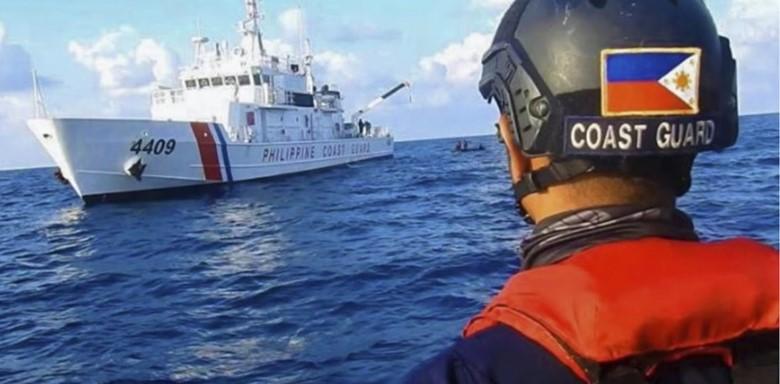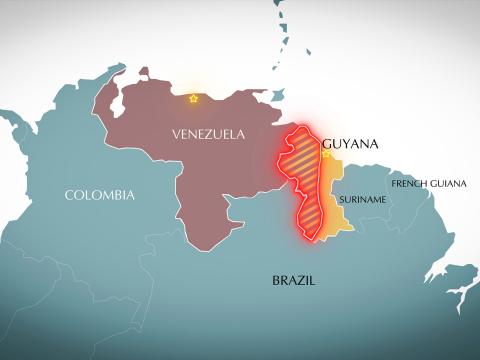Unity Is Key to Combating Chinese Aggression in the South China Sea
The South China Sea has long been a region of strategic importance and territorial contention. Over the past few decades, China's assertive claims and increasingly aggressive actions in the region have posed significant threats to the Philippines, neighboring countries and global allies.
"Foreign Policy" recently reported that China has particularly targeted the Philippines: the United States’ oldest ally in Southeast Asia. In acts of aggression, China has dispatched more than 100 Chinese coast guard ships and maritime militia vessels to interfere with resupply missions and disrupt operations in the Philippines’ Exclusive Economic Zone. China recently doubled the number of navy ships on a station nearby, expanding its harassment campaign to include military exercises around another small atoll, Sabina Shoal. Beijing’s persistent harassment of fishing and resupply vessels and efforts to assert control over contested waters have disrupted regional stability and undermined international maritime law.
Today, the Philippine Coast Guard requires more modern capabilities to defend against these attacks. The United States must act quickly to help modernize the Philippine military.
Having worked alongside the U.S. and Philippine military communities as a U.S. defense contractor in establishing, testing, researching and developing capabilities, I have seen firsthand the barriers to decisive action due to the bureaucracy in place. We must act now to bolster the Philippines’ defense posture with these four actions:
- Approve realistic defense requests: Expedite approval of requests for advanced defense systems, surveillance technology and cyber defense capabilities. The United States must avoid fielding expensive systems, as it has done in the past, that do little to enhance security in an archipelago of over 7,000 islands. A prime example is deploying one unmanned surface vessel for $11 million. How much does this really increase security and responsiveness? Equipment fielded from different nations can lead to interoperability issues due to different systems and legal/regulatory information sharing requirements that must be coordinated between nations. Additionally, when Foreign Military Sales efforts are undertaken, nations must ensure that training and maintenance issues are addressed so that equipment, while new, is also usable and can continue to fill requirements.
- Increase military aid: Provide substantial military aid to enhance the Philippines' ability to defend its maritime rights. The United States is taking steps to do this with a significant amount allowed to plus up capabilities; however, how much of this money will go to the Philippines? And how much of that is earmarked for existing large systems that cost exorbitant amounts?
- Support asymmetric warfare: Offer training and support in asymmetric warfare to enhance the Philippines' defense strategies. As shown in the past, irregular warfare is a key strength of the Philippine Armed Forces. From engagements in Marawi to its involvement in WWII to fighting the Spanish occupation, the Philippines has built extreme expertise in fighting this type of war versus what the United States would think of in a peer or near-peer engagement. Again, while there is a place for large, expensive systems, the Philippines is not prepared to go toe to toe with China as far as equipment is concerned. The United States must support its ally's needs and not force big, expensive systems into the inventory. Furthermore, the United States should be a responsible ally and advise its partners better.
- Develop in-depth societal defense: Foster better intelligence and analysis capabilities as well as counter-disinformation campaigns. This would benefit the Philippines but also society as a whole at a global scale. Politically, the Philippines can build alliances with like-minded countries, engage in multilateral forums and advocate for international law and freedom of navigation. These actions will amplify its voice on the global stage and rally support for its cause. Economically, investing in infrastructure, enhancing trade relations and diversifying the economy will bolster resilience against external threats. Pursuing legal action through international courts and arbitration panels can reinforce the Philippines' claims and apply pressure on adversaries. Legal victories, such as the 2016 Hague ruling, bolster diplomatic efforts and garner international support.
Cultural Strengths as Catalysts for Action
The Philippines can leverage its cultural strengths to galvanize collective action. The concept of bayanihan, ingrained in Filipino culture, embodies communal unity and cooperation. This spirit of coming together can mobilize the Filipino people to protect their maritime rights and resources. Similarly, the resilience and deep-seated patriotism of Filipinos, forged through centuries of overcoming adversity, can serve as a powerful force in confronting challenges in the South China Sea. Furthermore, this cultural facet can help build in-depth societal defense as resiliency can be built against the ongoing disinformation campaigns rampant in the nation. However, the tools needed to support this do not exist in the current environment.
Lessons from Ukraine
The recent conflict in Ukraine offers valuable lessons. Ukraine's effective use of asymmetric tactics against a more powerful adversary demonstrates the potential of such strategies. Ukrainian forces have employed guerrilla warfare, cyber operations and information warfare to disrupt and weaken Russian advances. This highlights the importance of agility, adaptability and innovation—principles the Philippines can adopt to strengthen its defense posture—in asymmetric warfare.
By acting decisively, the United States and allied nations can help ensure stability and security in the South China Sea, supporting the Philippines in safeguarding its sovereignty and territorial integrity.
Emil Reynolds, a first-generation Filipino American, is a 10-year U.S. Army veteran who served both in conventional forces and in Special Operations, completing multiple tours in Iraq and Afghanistan. He is senior director of business development at Reticulate Micro, a defense technology company. He also is the founder of Combat Bound LLC, a veteran-owned small business defense firm, where he has advised the Philippines and other allies on innovative capabilities to support warfighters and first responders.





Comments